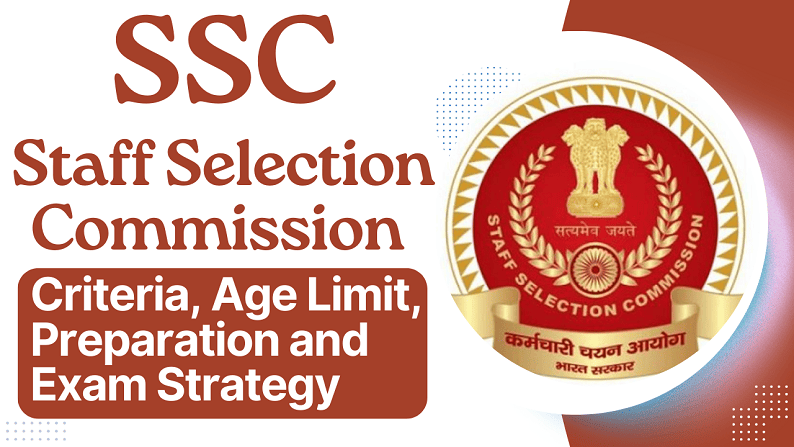SSC – Staff Selection Commission – Criteria, Age Limit, Preparation and Exam Strategy
SSC – Staff Selection Commission – Imagine landing a stable, well-paying government job with perks, job security, and social respect. Sounds like a dream, right? Well, the SSC Exam is your golden ticket to making that dream a reality.
But let’s be honest—SSC exams can feel overwhelming. With multiple tiers, endless syllabi, and fierce competition, it’s easy to get lost. But don’t worry—I’ve got you covered.
This guide breaks down everything you need to know about SSC exams—types, eligibility, preparation strategies, and FAQs—so you can tackle the exam with confidence.
What is the SSC Exam?
The Staff Selection Commission (SSC) conducts various recruitment exams for government posts in ministries, departments, and organizations of the Indian government. These jobs offer stable careers, attractive salaries, and plenty of growth opportunities.
SSC conducts multiple exams, including:
SSC CGL (Combined Graduate Level Exam) – For graduate-level posts like Income Tax Officer, Auditor, and Assistant Section Officer.
SSC CHSL (Combined Higher Secondary Level Exam) – For 12th-pass candidates applying for roles like LDC, DEO, and Postal Assistant.
SSC MTS (Multi-Tasking Staff Exam) – For 10th-pass candidates looking for government support staff positions.
SSC CPO (Central Police Organization Exam) – For posts like Sub-Inspector in Delhi Police and CAPFs.
SSC GD (General Duty Constable Exam) – For entry-level police and paramilitary forces positions.
SSC Stenographer Exam – For Stenographers in Grade C and D across various departments.
SSC JE (Junior Engineer Exam) – For engineering graduates in Civil, Mechanical, and Electrical fields.
Eligibility Criteria
Each SSC exam has different eligibility requirements. Here’s a quick breakdown:
Exam – Education Qualification – Age Limit
- SSC CGL – Graduate in any discipline – 18 – 32 years
- SSC CHSL – 12th Pass 18 – 27 years
- SSC MTS – 10th Pass 18 – 25 years
- SSC CPO – Graduate + Physical Fitness – 20 – 25 years
- SSC GD – 10th Pass + Physical Fitness – 18 – 23 years
- SSC JE Engineering – Diploma/Degree – 18 – 32 years
- SSC Stenographer – 12th Pass + Steno skills – 18 – 30 years
(Note: Age relaxation applies for reserved categories as per government rules.)
Exam Pattern & Selection Process
Most SSC exams follow a multi-tier selection process, including:
Tier 1 – Computer-Based Test (CBT) with MCQs.
Tier 2 – Advanced subjects (varies by exam).
Tier 3 – Descriptive paper (CGL & CHSL).
Tier 4 – Skill Test/Interview (if applicable).
For example, SSC CGL follows this pattern:
Tier 1: General Awareness, Reasoning, Quantitative Aptitude, English (Objective).
Tier 2: Quantitative & English, followed by Statistics & General Studies for specific posts.
Tier 3: Descriptive Paper (Essay, Letter Writing).
Tier 4: Computer Proficiency/Skill Test (for certain posts).
Preparation Strategy to Crack SSC Exams
Understand the Syllabus: Don’t waste time on irrelevant topics. Download the official SSC syllabus and stick to it.
Create a Study Plan: Break your preparation into daily and weekly targets. Give extra time to your weak areas.
Practice Previous Year Papers: Most SSC questions are repeated or follow a pattern. Practicing past papers boosts confidence.
Mock Tests Are Your Best Friend: Take online mock tests regularly to improve speed and accuracy.
Current Affairs & General Knowledge: Read newspapers, follow government schemes, and stay updated on important topics.
Time Management is Key: SSC exams have strict time limits. Practice solving questions within the given timeframe.
Stay Healthy & Stress-Free: A clear mind helps in better retention and performance. Don’t overburden yourself.
FAQs about SSC Exam
Q1. Which is the easiest SSC exam to crack?
A: SSC MTS is considered easier since it has fewer applicants and a simple syllabus. However, it depends on your preparation.
Q2. How many attempts are allowed for SSC exams?
A: There’s no attempt limit, but there is an age limit. As long as you’re within the age criteria, you can attempt the exam multiple times.
Q3. Is coaching necessary for SSC exams?
A: No, self-study + online resources can help you crack SSC exams if you’re disciplined. However, coaching can be beneficial if you need structured guidance.
Q4. What is the salary after clearing the SSC exam?
A: Salary depends on the post. Here’s a rough idea:
- SSC CGL: ₹44,900 – ₹1,42,400 (Pay Level 7)
- SSC CHSL: ₹19,900 – ₹63,200 (Pay Level 2)
- SSC GD Constable: ₹21,700 – ₹69,100
- SSC JE: ₹35,400 – ₹1,12,400 (Pay Level 6)
Q5. What is the best book for SSC exam preparation?
A: Some highly recommended books:
- Quantitative Aptitude: R.S. Aggarwal
- English: Wren & Martin, SP Bakshi
- General Knowledge: Lucent’s GK
- Reasoning: R.S. Aggarwal, MK Pandey
Q6. Can final-year students apply for SSC exams?
A: Yes, but you must produce your degree certificate before document verification.
Q7. Is SSC CGL tougher than UPSC?
A: SSC CGL is easier than UPSC because it focuses on aptitude, reasoning, and general awareness, whereas UPSC requires in-depth knowledge and analytical thinking.
Final Thoughts – Your SSC Success Story Begins Now!
Cracking the SSC exam is no easy feat, but with dedication, smart planning, and consistent effort, you can secure a prestigious government job. Start today—create your study plan, practice regularly, and believe in yourself.
What’s next?
- Bookmark this article for future reference.
- Share it with fellow SSC aspirants.
- Drop a comment if you have any doubts—I’ll be happy to help!
So friends, we hope you like our article on “SSC – Staff Selection Commission – Criteria, Age Limit, Preparation and Exam Strategy”.
Thanks for visiting Physics Wala


